Reviews
Ralph Bakshi
USA, 1977
Credits
Review by Michael Nordine
Posted on 18 April 2011
Source 20th Century Fox DVD
Categories Ralph Bakshi’s Cool Worlds
Wizards marks Ralph Bakshi’s transition into fantasy and away from controversy. Given the film’s overt evocations of Hitler and the Nazis—to say nothing of the range of reactions elicited by Bakshi’s three previous films—this comes as something of a surprise. The director’s semi-futuristic dystopia is built on the retrofitted horrors of the Third Reich as well as conceptions of magic and technology (embodied by twin wizards named Avatar and Blackwolf, respectively) that at first appear black and white but eventually reveal unexpected shades of grey. It’s clear that Bakshi knows what he’s doing with Wizards, he just tends not to let us know what that is until the last possible moment.
Complicating matters further is the fact that he isn’t altogether subtle in his approach. Bakshi at first deals in absolutes and decidedly large numbers (millions of years have passed since the nuclear holocaust that forever cemented the rift between magic and technology; Blackwolf spends five-thousand years living a monastic life and increases his knowledge ten-thousandfold; one million soldiers die in a single battle) that obscure the more subtle aspects of Wizards. Narrator Susan Tyrrell informs us, in no uncertain terms and with a melancholic quality to her voice, of technology’s evils in the opening prologue. Other sepia-toned, Tyrrell-narrated interludes composed of still images recur frequently throughout the film and are perhaps its most rewarding set-pieces in terms of both style and content. Bakshi has a tendency to do too many things at once and, as a result, not do any of them as well as he could; at his most toned-down and straightforward, however, his artistry has a chance to show itself unobscured. Wizards is meant to be vast, but its smallest moments tend to be its most memorable.
Still, the film is almost immediately problematic. Try as Bakshi initially does to portray magic and technology as diametrically opposed to one another, they come off as being two components of the same whole. Both transcend the laws of nature and are used as instruments of war; the only real difference between the two is that magic does so in harmony with nature while technology more often destroys it. Bakshi and his team of animators nonetheless go to great lengths to underline the differences between the lands of magic and of technology. Where the former is colorful and idyllic, the latter is barren and irradiated; where one is bright, the other is dark.
The aforementioned Nazi iconography is certainly the most outwardly striking element in Wizards, but it’s also the most conceptually ambitious. Here, as with his portrayal of good and evil, Bakshi leaves little to the imagination: Blackwolf is a sort of post-apocalyptic führer seated on a throne with a room-length swastika painted underneath it. What’s more, he has as a secret weapon a projector dubbed the “dream machine” pre-loaded with propaganda footage of Hitler, which he uses to launch his soldiers—monsters and ghouls all—into a trance-like frenzy. In the face of these (live-action, unsimulated) horrors captured on celluloid, Avatar’s army of elves is horrified to the point of immobility and slaughtered without mercy. These scenes are truly unsettling: at certain points, the footage becomes the background itself; Blackwolf and Avatar’s armies are superimposed over images of marching Nazis as death begets death. What’s past is prologue indeed, but Bakshi seems less preoccupied with the notion that history repeats itself than the ways in which people knowingly march to their doom in the name of an ideal they scarcely understand. (One could also speculate that the link between the power of moving images and the Third Reich may have had a certain influence on Quentin Tarantino, an avowed Bakshi supporter, in the making of Inglorious Basterds.)
In this vein, a robot-like being named Necron 99 emerges within the first few minutes as the film’s most intriguing character. Programed by Blackwolf to indiscriminately purge the desolate wasteland of magic-followers—and by Bakshi to embody the evils of technology—he rides an old, miserable-looking beast of burden across the stricken lands of Bakshi’s reckoning. (When the fantastical creature dies of an arrow through the head that was intended for its master, Necron is expectedly unfazed.) Necron is death incarnate, the scourge of magic; he’s an emotionless killing machine designed to give a face to the evil permeating Wizards. He gains a certain faceted quality, however, when Avatar captures and reprograms him into a pacifist named Peace. But the reeducation doesn’t stop him shooting people or grant him a personality of his own; it instead teaches him to shoot different people and monosyllabically parrot what he’s been taught (“Peace wants love. Wants free. Will help”) by Avatar with a noticeable slur. In so doing, he comes to represent the inherent danger of blindly following any doctrine, whether it champions peace, war, or what have you.
Amid this bloodshed and ultra-violence, an overlooked and underrepresented group emerges as being levelheaded: the fairies. When Avatar and his female companion Elinore come into their land on the way to his final confrontation with his brother, the fairy king proclaims:
We will neither join nor hinder nor help these two; we will wait and see. That is our decision.
Within the film’s mythology, the crafting of a neutral third party is paramount. The ensuing battle between Avatar and Blackwolf—and, by extension, magic and technology—involves neither the fairies nor even the brothers’ respective armies, but it does further underscore the magic/technology duality when (spoilers herein) Avatar kills Blackwolf with a single shot from a previously-unseen pistol he pulls out of his sleeve. At once, Bakshi’s point emerges: technology isn’t evil in and of itself; certain of its users are. In reducing the conflict between his two core concepts to a sibling rivalry taken too far, Bakshi adeptly draws attention to its triviality.
Wizards (like all of Bakshi’s films) is something of an acquired taste. It sets out to accomplish a very particular set of goals in a very particular way, and may prove inhospitable to viewers hoping for anything else. Wizards requires one to be either fully on board with it or not on board at all; anyone caught in the middle is likely to go the way of the fairy: astute but unnoticed.
More Ralph Bakshi’s Cool Worlds
-
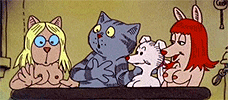
Fritz the Cat
1972 -
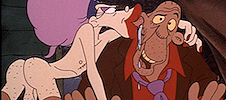
Heavy Traffic
1973 -
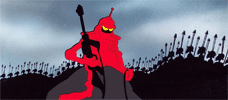
Wizards
1977 -
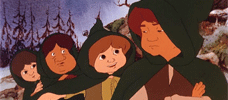
The Lord of the Rings
1978 -
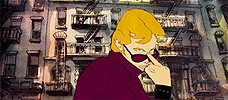
American Pop
1981 -

Hey Good Lookin’
1982 -

Fire and Ice
1983 -

Mighty Mouse: The New Adventures
1987–1988 -

Cool World
1992 -
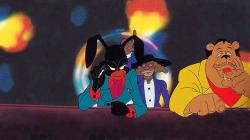
Coonskin
1975
We don’t do comments anymore, but you may contact us here or find us on Twitter or Facebook.



